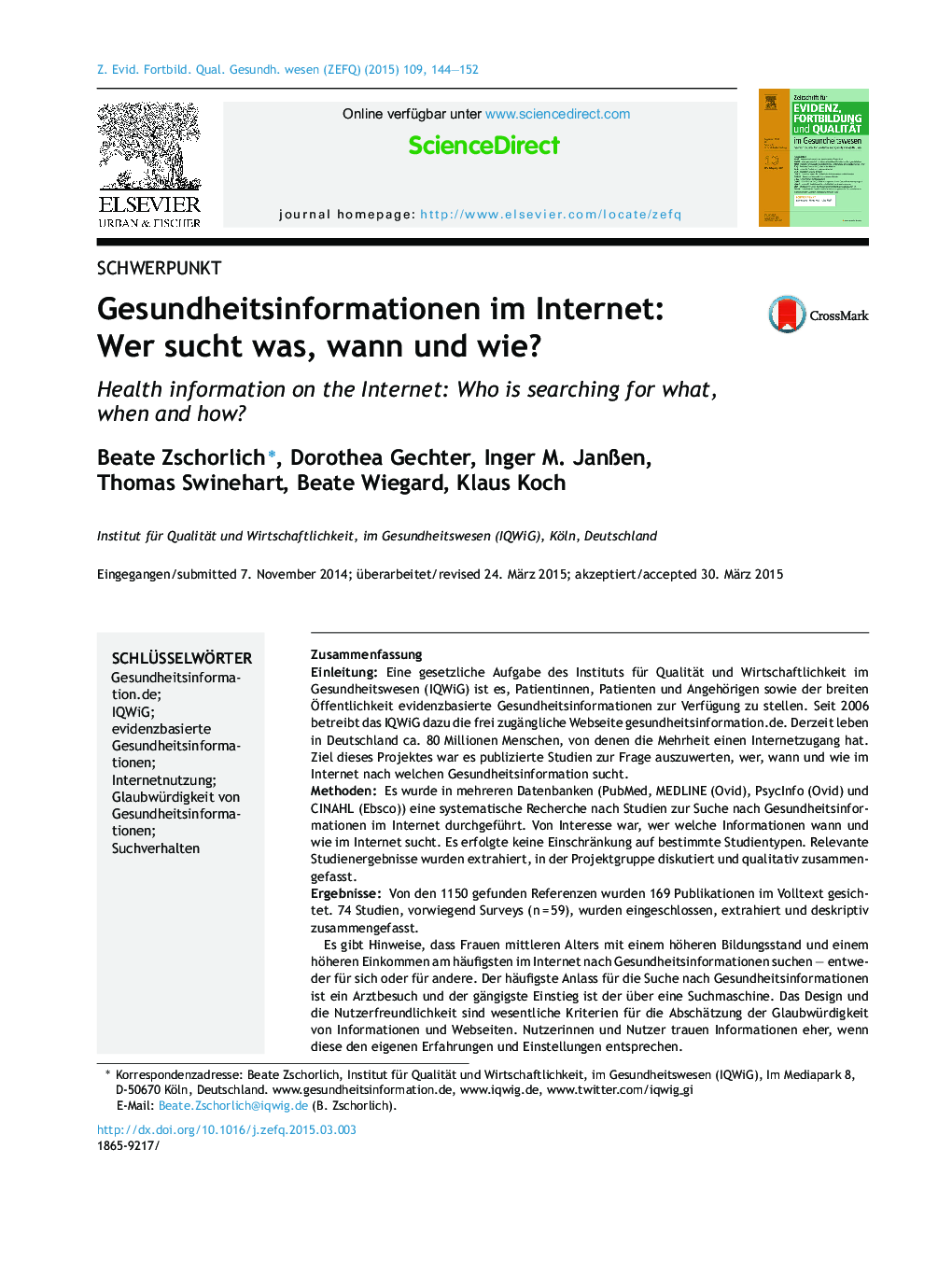| کد مقاله | کد نشریه | سال انتشار | مقاله انگلیسی | نسخه تمام متن |
|---|---|---|---|---|
| 1094058 | 952515 | 2015 | 9 صفحه PDF | دانلود رایگان |
ZusammenfassungEinleitungEine gesetzliche Aufgabe des Instituts für Qualität und Wirtschaftlichkeit im Gesundheitswesen (IQWiG) ist es, Patientinnen, Patienten und Angehörigen sowie der breiten Öffentlichkeit evidenzbasierte Gesundheitsinformationen zur Verfügung zu stellen. Seit 2006 betreibt das IQWiG dazu die frei zugängliche Webseite gesundheitsinformation.de. Derzeit leben in Deutschland ca. 80 Millionen Menschen, von denen die Mehrheit einen Internetzugang hat. Ziel dieses Projektes war es publizierte Studien zur Frage auszuwerten, wer, wann und wie im Internet nach welchen Gesundheitsinformation sucht.MethodenEs wurde in mehreren Datenbanken (PubMed, MEDLINE (Ovid), PsycInfo (Ovid) und CINAHL (Ebsco)) eine systematische Recherche nach Studien zur Suche nach Gesundheitsinformationen im Internet durchgeführt. Von Interesse war, wer welche Informationen wann und wie im Internet sucht. Es erfolgte keine Einschränkung auf bestimmte Studientypen. Relevante Studienergebnisse wurden extrahiert, in der Projektgruppe diskutiert und qualitativ zusammengefasst.ErgebnisseVon den 1150 gefunden Referenzen wurden 169 Publikationen im Volltext gesichtet. 74 Studien, vorwiegend Surveys (n = 59), wurden eingeschlossen, extrahiert und deskriptiv zusammengefasst.Es gibt Hinweise, dass Frauen mittleren Alters mit einem höheren Bildungsstand und einem höheren Einkommen am häufigsten im Internet nach Gesundheitsinformationen suchen – entweder für sich oder für andere. Der häufigste Anlass für die Suche nach Gesundheitsinformationen ist ein Arztbesuch und der gängigste Einstieg ist der über eine Suchmaschine. Das Design und die Nutzerfreundlichkeit sind wesentliche Kriterien für die Abschätzung der Glaubwürdigkeit von Informationen und Webseiten. Nutzerinnen und Nutzer trauen Informationen eher, wenn diese den eigenen Erfahrungen und Einstellungen entsprechen.DiskussionEs zeigt sich eine steigende Tendenz, das Internet als Quelle für Gesundheitsinformationen zu nutzen. Das Vertrauen in und die Glaubwürdigkeit von Informationen bzw. Webseiten scheint zum großen Teil von Faktoren abzuhängen, die wenig mit der inhaltlichen Qualität zu tun haben. Dies stellt eine besondere Herausforderung für die Aufbereitung und Verbreitung evidenzbasierter Gesundheitsinformationen dar. Es besteht ein Bedarf an Studien, die die Bedürfnisse der einzelnen Nutzergruppen von Gesundheitsinformationen im Internet untersuchen.
SummaryIntroductionThe Institute for Quality and Efficiency in Health Care (IQWiG, Germany) has a statutory mandate to provide patients and their family members as well as the wider public with evidence-based health information (www.informedhealthonline.org). Since 2006 IQWiG has maintained the publicly available website gesundheitsinformation.de. Currently, about 80 million people live in Germany, and the majority of them have internet access. The goal of this project was to evaluate published studies examining health information seeking behaviour (who, when and how) on the internet.MethodsA systematic search was conducted in several databases (PubMed, MEDLINE [Ovid)], PsycInfo [Ovid] und CINAHL [Ebsco]) for studies on internet searches for health information. No study type restrictions were imposed. Data were extracted from the relevant studies, and then discussed in the project group and summarised qualitatively.ResultsOf the 1,150 abstracts identified, 169 publications were analysed in full. 74 studies were included, most of which were surveys (n = 59). The data were extracted from these studies and then summarised qualitatively to obtain an overview of the current state of research in this field.The results suggest that the group most often searching for health-related information on the internet – either on their own behalf or on behalf of others – consists of middle-aged women with a higher level of education and income. The most common reason for initiating a search for health information is a visit to the doctor, and the most common starting point is a search engine. Page layout and user-friendliness are the main criteria for assessing the credibility of websites and the information they provide. Users are more likely to trust information that is consistent with their own experiences and opinions.DiscussionThere is a growing trend of using the internet as a source for health information. It seems that trust in the credibility of a given website or information mostly depends on factors that are hardly related to the quality of content. This may pose a particular challenge for the creation and dissemination of evidence-based health information. Further research is required to examine the needs of the individual groups using internet-based health information.
Journal: Zeitschrift für Evidenz, Fortbildung und Qualität im Gesundheitswesen - Volume 109, Issue 2, 2015, Pages 144–152
